Unit 1 Know yourself Grammar 课件(共29张PPT) 牛津译林版九年级英语上册
文档属性
| 名称 | Unit 1 Know yourself Grammar 课件(共29张PPT) 牛津译林版九年级英语上册 |
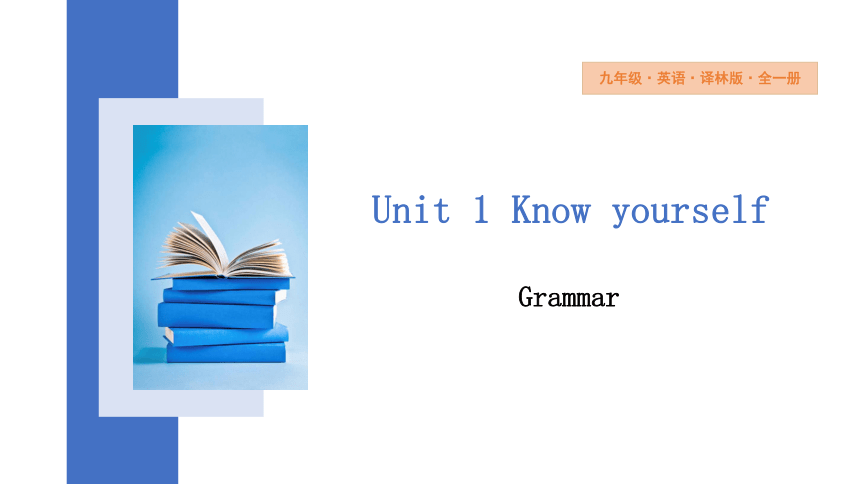
|
|
| 格式 | pptx | ||
| 文件大小 | 859.8KB | ||
| 资源类型 | 教案 | ||
| 版本资源 | 牛津译林版 | ||
| 科目 | 英语 | ||
| 更新时间 | 2024-01-12 00:00:00 | ||
图片预览

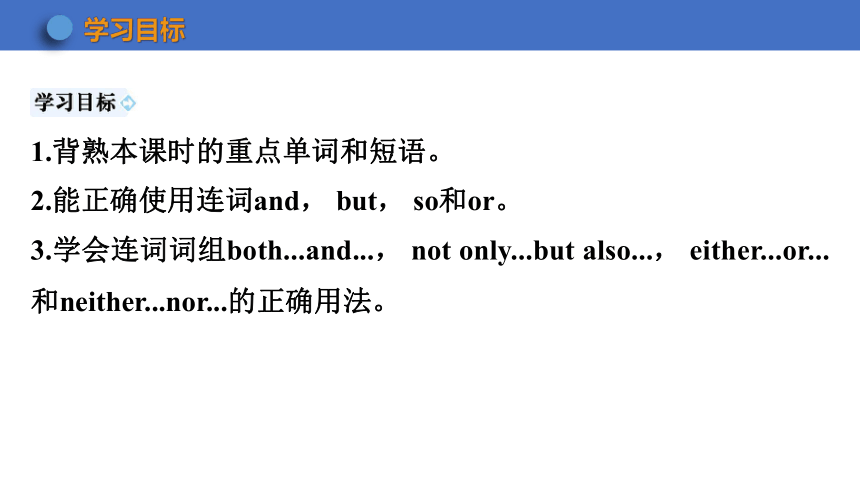

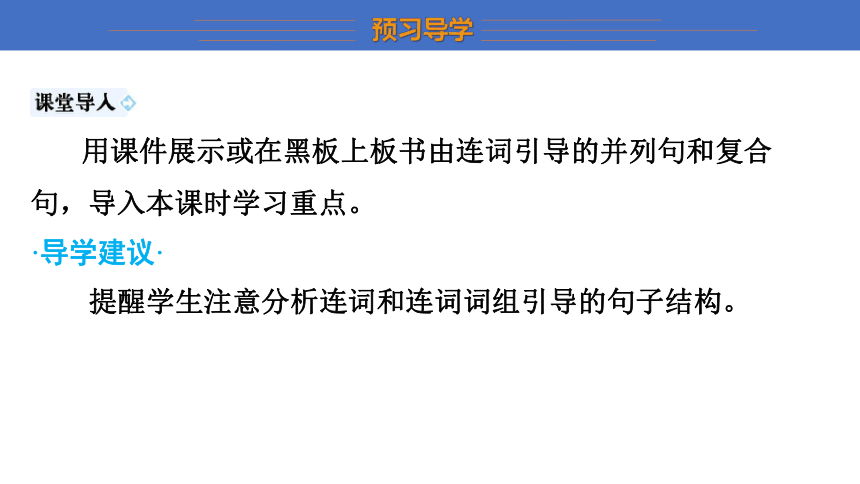

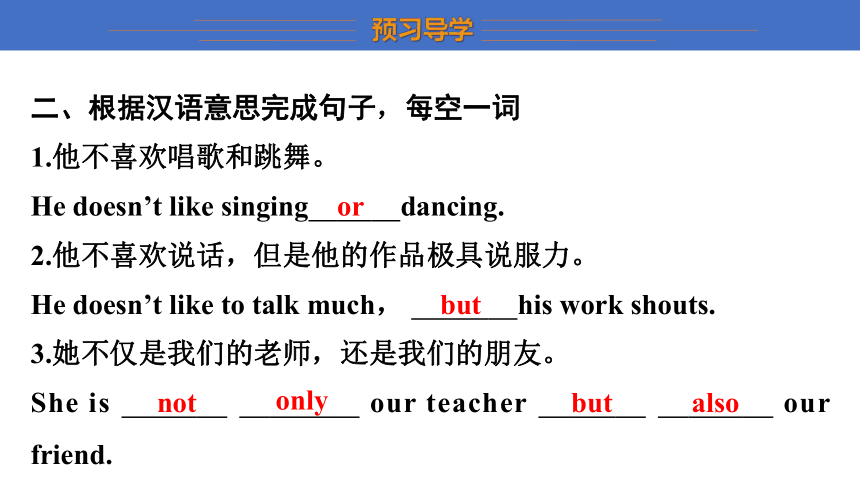
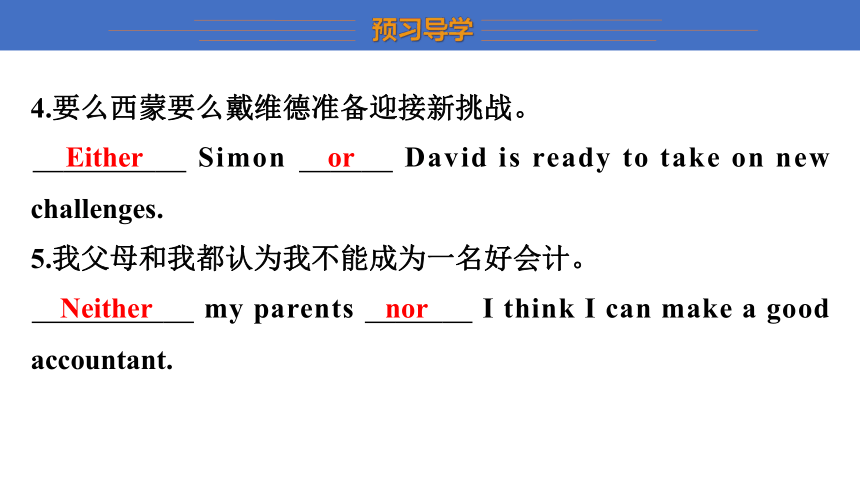
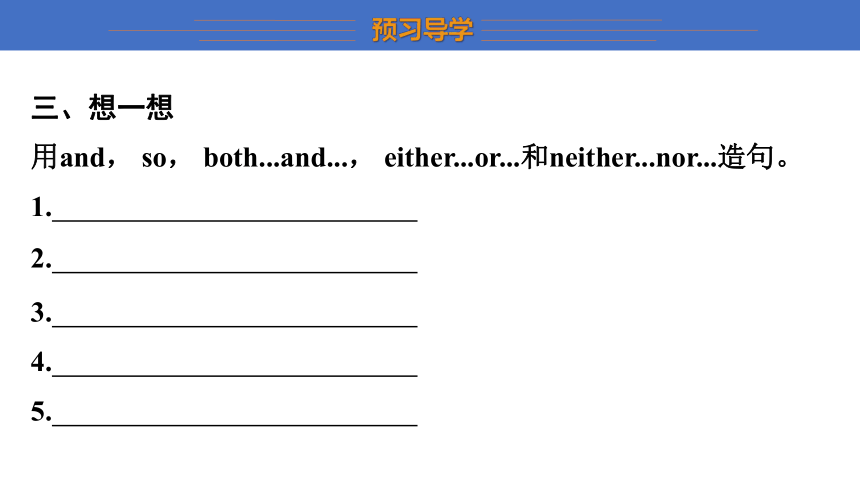
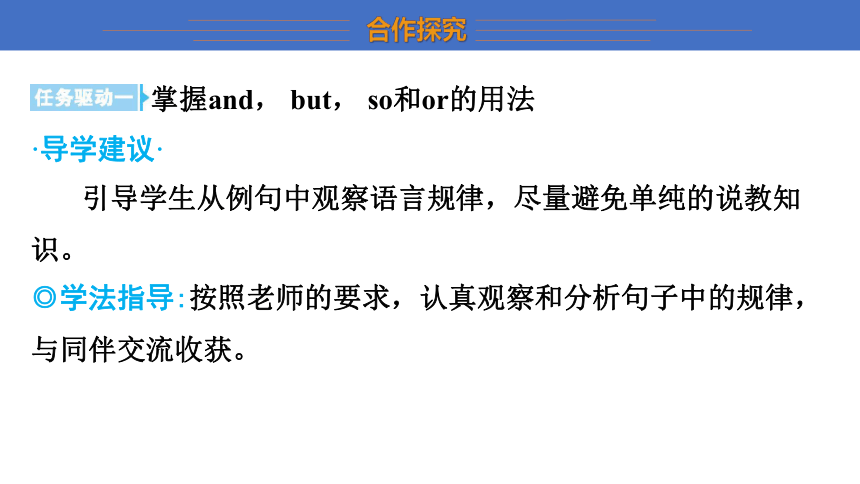
文档简介
(共29张PPT)
九年级·英语·译林版·全一册
Unit 1 Know yourself
Grammar
1.背熟本课时的重点单词和短语。
2.能正确使用连词and, but, so和or。
3.学会连词词组both...and..., not only...but also..., either...or...和neither...nor...的正确用法。
1.完成任务驱动一, 达成学习目标1、2。
2.完成任务驱动二, 达成学习目标1、3。
用课件展示或在黑板上板书由连词引导的并列句和复合句,导入本课时学习重点。
·导学建议·
提醒学生注意分析连词和连词词组引导的句子结构。
一、写出下列单词或短语
1.不耐烦的 impatient
2.三思而行 think twice
3.洗碗 do the dishes
4.说得多 talk much
5.采纳别人的建议 accept others’ advice
6.与……相符,适合 be suitable for
impatient
think twice
do the dishes
talk much
accept others’ advice
be suitable for
二、根据汉语意思完成句子,每空一词
1.他不喜欢唱歌和跳舞。
He doesn’t like singing or dancing.
2.他不喜欢说话,但是他的作品极具说服力。
He doesn’t like to talk much, but his work shouts.
3.她不仅是我们的老师,还是我们的朋友。
She is not only our teacher but also our friend.
or
but
not
only
but
also
4.要么西蒙要么戴维德准备迎接新挑战。
Either Simon or David is ready to take on new challenges.
5.我父母和我都认为我不能成为一名好会计。
Neither my parents nor I think I can make a good accountant.
Either
or
Neither
nor
三、想一想
用and, so, both...and..., either...or...和neither...nor...造句。
1.
2.
3.
4.
5.
掌握and, but, so和or的用法
·导学建议·
引导学生从例句中观察语言规律,尽量避免单纯的说教知识。
◎学法指导:按照老师的要求,认真观察和分析句子中的规律,与同伴交流收获。
1.观察、分析下列例句,与同伴讨论后填空。
(1)I’m active and energetic, and I love working with people.
两个句子之间意思 相近 ,两句之间是 递进 或 顺承 关系,此时用 and 连接两个句子。
相近
递进
顺承
and
(2)I can be a good teacher or a good doctor.
两个句子之间意思 相近 ,两句之间是 选择 关系,此时用 or 连接供选择的两部分。在否定句中,我们用or连接两个并列的部分,如:
相近
选择
or
She doesn’t want to play football or basketball.She likes playing ping-pong.
(3)He is always careful, but he made some mistakes in this exam.
两个句子之间意思 相反 ,两句之间是 转折 关系,此时用 but 连接两个句子。
相反
转折
but
(4)
I want to share the best art with people, so I’m always searching for something better or different.
两个句子之间是 因果 关系,此时用 so 连接两个句子。
因果
so
◎学法指导:通过以上句子的分析,连词的用法总结如下:
连词是一种虚词,并列连词是连词的一种,它们可以把两个句子连接起来。常见的并列连词有and, but, or和so, 在句子中分别表达顺承关系、转折关系、选择关系、因果关系等。
2.从and, but, or和so中选择合适的连词把下列句子连接起来。
(1)Liu Yan was the youngest of the climbers.She was the first one to climb the top.
Liu Yan was the youngest of the climbers, but she was the first one to climb the top.
Liu Yan was the youngest of the climbers, but she was the first one to climb the top.
(2)I came into the classroom.I put my schoolbag on the desk.
I came into the classroom, and I put my schoolbag on the desk.
(3)The radio says it’s going to rain today.My father takes an umbrella with him.
The radio says it’s going to rain today, so my father takes an umbrella with him.
I came into the classroom, and I put my schoolbag on the desk.
The radio says it’s going to rain today, so my father takes an umbrella with him.
(4)Bill’s going to plant the tree behind his house.Bill’s going to plant the tree in the yard.
Bill’s going to plant the tree behind his house or in the yard.
Bill’s going to plant the tree behind his house or in the yard.
3.完成教材中Millie’s classmates的练习
both...and..., not only...but also..., either...or...和neither...nor...的用法
·导学建议·
注意和“任务驱动一”的句子相比较,弄清句子的类型:简单句还是并列句。
◎学法指导:观察当这些连词短语连接两个主语时,谓语动词的单复数情况。
1.观察学习,总结比较。
连词 例句 both...and... We like both English and math. Both my sister and I are going to the Great Wall next week.
连接两个 宾 语 连接两个 主 语时,谓语动词用 复数 形式
宾
主
复数
连词 例句 not only...but also... We should eat not only vegetables but also fruits. Not only the books but also the pencil box is mine.
连接两个宾语 连接两个 主 语时,谓语动词用由离它最 近 的主语决定,就是用“就近原则”
主
近
连词 例句 either... or... You either go out or come in. Either you or I am wrong.
连接两个 谓 语 连接两个 主 语时,谓语动词由离它最 近 的主语决定,就是用“就近原则”
谓
主
近
连词 例句 neither... nor... He likes neither meat nor vegetables. Neither his parents nor he knows anything about it.
连接两个 宾 语 连接两个 主 语时,谓语动词由离它最 近 的主语决定,就是用“ 就近 原则”
宾
主
近
就近
2.练习巩固。
把下列句子合并成一句话。
(1)I don’t have brothers.I don’t have sisters.
=I have neither brothers nor sisters.
(2)My parents have been to West Lake. His parents have been to West Lake.
=Both my parents and his parents have been to West Lake.
I have neither brothers nor sisters.
Both my parents and his parents have been to West Lake.
(3)You help me carry the boxes.You help your mother with housework.
= You either help me carry the boxes or help your mother with housework.
I don’t think Susan will win.She doesn’t think Susan will win.
= Neither I nor she thinks Susan will win.
You either help me carry the boxes or help your mother with
housework.
Neither I nor she thinks Susan will win.
3.完成教材中Amy’s family and classmates的练习。
Bill would not accept others’ advice.Bill不会接受别人的建议。
◎用法总结:
accept和receive的区别
意思 用法 例句
accept 接受 表示主观上的感彩,从内心接受。 The boy accepted my apology.男孩接受了我的道歉。
receive 收到 表示客观上的收到某物等。不涉及内心感受。 I haven’t received his letter for a long time.我很长时间没收到他的信了。
填空。
I have received your e-mail, but I’m sorry I can’t accept your invitation.
received
accept
I do not think I can make a good accountant.我认为我不能成为一名好会计。
◎用法总结:
该句为宾语从句。在宾语从句中,如果主句的谓语动词是表示看法、感觉的词(think,believe等)且主语为第一人称时,把从句的否定含义转移到主句上,这是否定前移。注意翻译这些句子时,要把否定仍然翻译在从句上。如:
I don’t think chicken can swim.我认为鸡不会游泳。
翻译下列句子。
1.We don’t believe he will come here on time.
我们相信他不会准时到这儿。
2.I don’t think he is honest.
我认为他不诚实。
我们相信他不会准时到这儿。
我认为他不诚实。
九年级·英语·译林版·全一册
Unit 1 Know yourself
Grammar
1.背熟本课时的重点单词和短语。
2.能正确使用连词and, but, so和or。
3.学会连词词组both...and..., not only...but also..., either...or...和neither...nor...的正确用法。
1.完成任务驱动一, 达成学习目标1、2。
2.完成任务驱动二, 达成学习目标1、3。
用课件展示或在黑板上板书由连词引导的并列句和复合句,导入本课时学习重点。
·导学建议·
提醒学生注意分析连词和连词词组引导的句子结构。
一、写出下列单词或短语
1.不耐烦的 impatient
2.三思而行 think twice
3.洗碗 do the dishes
4.说得多 talk much
5.采纳别人的建议 accept others’ advice
6.与……相符,适合 be suitable for
impatient
think twice
do the dishes
talk much
accept others’ advice
be suitable for
二、根据汉语意思完成句子,每空一词
1.他不喜欢唱歌和跳舞。
He doesn’t like singing or dancing.
2.他不喜欢说话,但是他的作品极具说服力。
He doesn’t like to talk much, but his work shouts.
3.她不仅是我们的老师,还是我们的朋友。
She is not only our teacher but also our friend.
or
but
not
only
but
also
4.要么西蒙要么戴维德准备迎接新挑战。
Either Simon or David is ready to take on new challenges.
5.我父母和我都认为我不能成为一名好会计。
Neither my parents nor I think I can make a good accountant.
Either
or
Neither
nor
三、想一想
用and, so, both...and..., either...or...和neither...nor...造句。
1.
2.
3.
4.
5.
掌握and, but, so和or的用法
·导学建议·
引导学生从例句中观察语言规律,尽量避免单纯的说教知识。
◎学法指导:按照老师的要求,认真观察和分析句子中的规律,与同伴交流收获。
1.观察、分析下列例句,与同伴讨论后填空。
(1)I’m active and energetic, and I love working with people.
两个句子之间意思 相近 ,两句之间是 递进 或 顺承 关系,此时用 and 连接两个句子。
相近
递进
顺承
and
(2)I can be a good teacher or a good doctor.
两个句子之间意思 相近 ,两句之间是 选择 关系,此时用 or 连接供选择的两部分。在否定句中,我们用or连接两个并列的部分,如:
相近
选择
or
She doesn’t want to play football or basketball.She likes playing ping-pong.
(3)He is always careful, but he made some mistakes in this exam.
两个句子之间意思 相反 ,两句之间是 转折 关系,此时用 but 连接两个句子。
相反
转折
but
(4)
I want to share the best art with people, so I’m always searching for something better or different.
两个句子之间是 因果 关系,此时用 so 连接两个句子。
因果
so
◎学法指导:通过以上句子的分析,连词的用法总结如下:
连词是一种虚词,并列连词是连词的一种,它们可以把两个句子连接起来。常见的并列连词有and, but, or和so, 在句子中分别表达顺承关系、转折关系、选择关系、因果关系等。
2.从and, but, or和so中选择合适的连词把下列句子连接起来。
(1)Liu Yan was the youngest of the climbers.She was the first one to climb the top.
Liu Yan was the youngest of the climbers, but she was the first one to climb the top.
Liu Yan was the youngest of the climbers, but she was the first one to climb the top.
(2)I came into the classroom.I put my schoolbag on the desk.
I came into the classroom, and I put my schoolbag on the desk.
(3)The radio says it’s going to rain today.My father takes an umbrella with him.
The radio says it’s going to rain today, so my father takes an umbrella with him.
I came into the classroom, and I put my schoolbag on the desk.
The radio says it’s going to rain today, so my father takes an umbrella with him.
(4)Bill’s going to plant the tree behind his house.Bill’s going to plant the tree in the yard.
Bill’s going to plant the tree behind his house or in the yard.
Bill’s going to plant the tree behind his house or in the yard.
3.完成教材中Millie’s classmates的练习
both...and..., not only...but also..., either...or...和neither...nor...的用法
·导学建议·
注意和“任务驱动一”的句子相比较,弄清句子的类型:简单句还是并列句。
◎学法指导:观察当这些连词短语连接两个主语时,谓语动词的单复数情况。
1.观察学习,总结比较。
连词 例句 both...and... We like both English and math. Both my sister and I are going to the Great Wall next week.
连接两个 宾 语 连接两个 主 语时,谓语动词用 复数 形式
宾
主
复数
连词 例句 not only...but also... We should eat not only vegetables but also fruits. Not only the books but also the pencil box is mine.
连接两个宾语 连接两个 主 语时,谓语动词用由离它最 近 的主语决定,就是用“就近原则”
主
近
连词 例句 either... or... You either go out or come in. Either you or I am wrong.
连接两个 谓 语 连接两个 主 语时,谓语动词由离它最 近 的主语决定,就是用“就近原则”
谓
主
近
连词 例句 neither... nor... He likes neither meat nor vegetables. Neither his parents nor he knows anything about it.
连接两个 宾 语 连接两个 主 语时,谓语动词由离它最 近 的主语决定,就是用“ 就近 原则”
宾
主
近
就近
2.练习巩固。
把下列句子合并成一句话。
(1)I don’t have brothers.I don’t have sisters.
=I have neither brothers nor sisters.
(2)My parents have been to West Lake. His parents have been to West Lake.
=Both my parents and his parents have been to West Lake.
I have neither brothers nor sisters.
Both my parents and his parents have been to West Lake.
(3)You help me carry the boxes.You help your mother with housework.
= You either help me carry the boxes or help your mother with housework.
I don’t think Susan will win.She doesn’t think Susan will win.
= Neither I nor she thinks Susan will win.
You either help me carry the boxes or help your mother with
housework.
Neither I nor she thinks Susan will win.
3.完成教材中Amy’s family and classmates的练习。
Bill would not accept others’ advice.Bill不会接受别人的建议。
◎用法总结:
accept和receive的区别
意思 用法 例句
accept 接受 表示主观上的感彩,从内心接受。 The boy accepted my apology.男孩接受了我的道歉。
receive 收到 表示客观上的收到某物等。不涉及内心感受。 I haven’t received his letter for a long time.我很长时间没收到他的信了。
填空。
I have received your e-mail, but I’m sorry I can’t accept your invitation.
received
accept
I do not think I can make a good accountant.我认为我不能成为一名好会计。
◎用法总结:
该句为宾语从句。在宾语从句中,如果主句的谓语动词是表示看法、感觉的词(think,believe等)且主语为第一人称时,把从句的否定含义转移到主句上,这是否定前移。注意翻译这些句子时,要把否定仍然翻译在从句上。如:
I don’t think chicken can swim.我认为鸡不会游泳。
翻译下列句子。
1.We don’t believe he will come here on time.
我们相信他不会准时到这儿。
2.I don’t think he is honest.
我认为他不诚实。
我们相信他不会准时到这儿。
我认为他不诚实。
